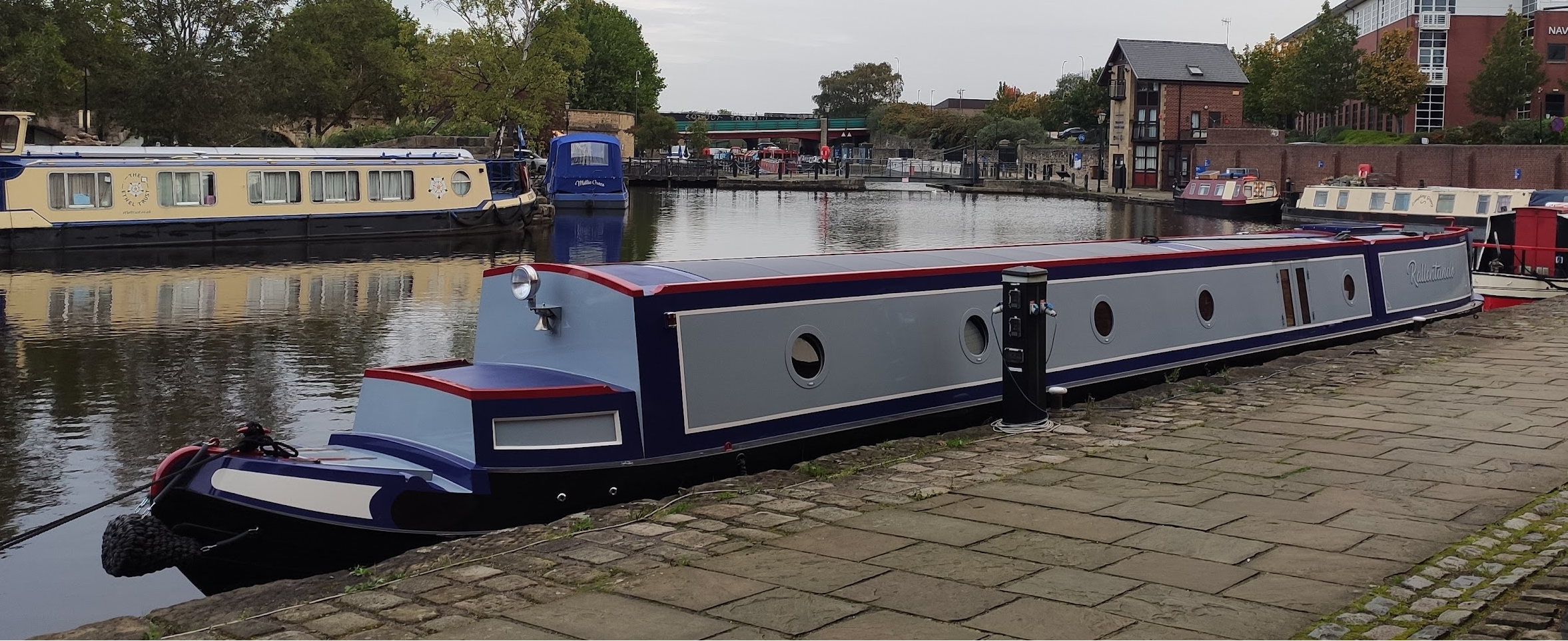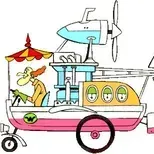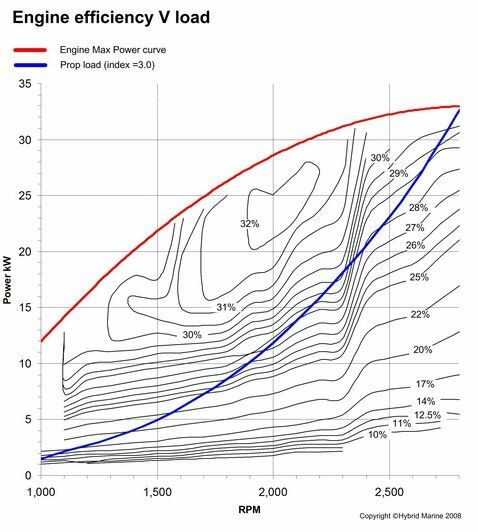-
Posts
11,310 -
Joined
-
Last visited
-
Days Won
87
Content Type
Profiles
Forums
Events
Gallery
Blogs
Store
Everything posted by IanD
-
This post cannot be displayed because it is in a forum which requires at least 10 posts to view.
-
That's rich coming from somebody who is slagging off the volockies of today but isn't even on the volocky-ridden canals (which you don't now like, as you often point out) any more, and hasn't been for some time... 😉 And who may be basing this volocky-hatred on one (very!) bad experience, completely ignoring any positive side to what volockies do -- and you accuse *him* of being blinkered? Really?
-
So if you got rid of them, who would do what they do today? Harking back to the days when "the canals operated quite satisfactorily under BW without them" is totally ignoring the fact that in those halcyon days of yore BW employed -- meaning, paid -- lengthsmen and lock keepers to do some of the niggly little tasks that the volockies do today. Yes it would be great if this was still the case. Where do you suggest the money to pay all these extra people comes from, compared to volockies who do the job (admittedly not as well...) for nothing? You seem to want to hark back to "the good old days" by ignoring the fact that the world has moved on. We have to live in the world we have (where funding after inflation is less and the canal network is considerably bigger than 50 years ago), not a fantasy one... (and to answer your question, the role was almost certainly created as a way of getting necessary stuff done without CART having to pay people to do it...)
-
This post cannot be displayed because it is in a forum which requires at least 10 posts to view.
-
You mean, just changing the name will fix your objection to them? (but I agree, "lock assistant" might be a better description) So you do agree that they are useful for all the other things I mentioned, meaning they're not "entirely superfluous"? 😉 Don't forget that the "professional Lock Keepers of old" were almost entirely dealing with seasoned professional boaters who needed no assistance or advice. Today is *very* different for many people -- not you, of course... 😉
-
Agreed for LA batteries, especially small ones. LFP are a different kettle of fish entirely, and were being discussed. Alternator current increases with rpm up to some point where it flattens off, this depends on the alternator -- how long this can be sustained for without overheating is a different matter. Beta use a 2.8:1 pulley ratio so an 850rpm idle means 2400rpm, which is likely to be below maximum alternator current. Engine efficiency generally increases with rpm and load up to the maximum torque rpm, so the fraction of the fuel energy that ends up in the batteries does too -- but at a given power level (alternator load) lower rpm is indeed better.
-
I used to enjoy caving... 😉
-
He's just pointing out that one bad apple does not necessarily make a rotten barrel (yes, I know...). Mistakes happen everywhere, nobody is perfect. What Alan is saying is equivalent to "I was fitted up by one corrupt policeman, so we should disband the entire police force"... So all the debris/rubbish clearing and painting and gear greasing and helping (maybe older or less strong) people through heavy locks are superfluous then? Who would do this if the volockies didn't?
-
A single alternator -- or even two small ones on v-pulleys -- is much less likely to cause a problem than a big alternator (or two) and a Travelpower on polyvee belts, which load the engine much more heavily and overhang further from the keyed crank. It's also true that not every installation like this had problems, but enough did for Beta to change to the splined crank. Higher charging revs (1200rpm or more) are better from all points of view -- faster charging (shorter engine run times ==> less fuel used and wear), cooler alternator, less risk of torsional vibration problems -- which is why Beta recommend it 🙂
-
Having done one lock successfully doesn't mean you won't get the boat hung up on the cill at the next one, or hang the boat up on a tied rope, or flood the foredeck by opening gate paddles too early, or waste lots of water by not closing paddles (sometimes at both ends at the same time), or lots of other things that you learn from either being educated about locks or making mistakes in them. Many times I've seen things like this being done (or boats have sunk in locks) it wasn't the first lock they'd done or even one of the first few, it was a mistake sometimes driven by ignorance ("do I just open the doors?") or complacency ("I know what I'm doing") or inattention (looking at phone instead of watching boat/lock) -- and nobody is guilt-free here, even experienced boaters still make mistakes sometimes. Of course volockies aren't a complete solution to numpty cock-ups, but helpful ones must reduce the chances of them -- always assuming they know what they're doing, which not all do... 😉 And for people who find (some) locks hard work, some assistance can be welcome 🙂 My suggestion came from an article about canal boating -- and no I can't remember where this was and I'm not going to spend ages looking for it. This argument would be settled if somebody (Magpie Patrick?) has some actual numbers one way or the other, until then it's just a difference of opinion -- and we all know about opinions, don't we? 😉
-
A lot of this is pure diversion from the original subject of volockies... I think Arthur hit the nail on the head when he described why volockies do what they do -- they're there because they probably love the canals (unlike many posters on CWDF) and want to do something involved with them (including helping at locks), and are willing to do this for nothing, including some of the less pleasant things like rubbish clearing, both from the towpath and canal. Magpie Patrick seems to think this is all terribly inefficient and they should behave like good little worker bees, buzzing around and doing exactly what boaters want, not some of what they want like enjoying themselves. Which might work if they were paid (because employees do stuff they don't want to do in return for a wage and having a job), but volunteers are free to just walk away and not look back. Others resent them sticking their noses in where they're not wanted or being "condescending or rude", ignoring the fact that people in all walks of life do exactly the same and keep their jobs -- which they're paid for, not doing for free. And as for comments like those from Nick, words fail me -- I'll put one of his quotes together with some of similar sentiments... "Only trouble is that at least 50% of volunteers are miserable old grey bearded taciturn types with no social skills and barely the power of speech" "Dirty thieving gyppoes, half of them would steal your car as soon as look at you" "Most black kids are only interested in smoking dope and stabbing each other" Volockies aren't by any means perfect, but the canals would be a poorer place without them -- literally, if CART had to pay employees to do what they do... Thank you for providing some numbers. Do you have any figures (licenses and hire boats) going further back, for example to the 1970s? (and more shorter hire boat trips does by definition mean more hirers, and more of them will probably be new to the canals) Certainly from my recollection, there were fewer hire boats back then, going on a canal holiday was seen as a bit weird rather than the commonplace thing it is today.
-
A lot of the smaller boat hire companies were bought out by now-bigger ones like ABC. Bulky paper catalogues have disappeared from the world today with the advent of online marketing. From my observations, there certainly didn't use to be anything like the queues for locks then that there are nowadays, so the extra boats must have come from *somewhere" -- and canal holidays are reported to be more popular now than they were then (when they were a bit of a novelty), partly driven by increasingly well-equipped boats. I'll go and try and find some historical figures for hire boat numbers, maybe you could do the same? 😉
-
<sigh> if more people move onto the canals over a few years (which has clearly happened, see CART statistics about number of licenses) then they are by definition novices -- and especially if they move very little where there are few or no locks (which seems to be where most of them moor) then they're certainly novices regarding lock operation, even after a few years. I've met quite a few boaters at locks all over the system in the last few years who haven't had a clue about how they work or how to operate them correctly or safely. If you haven't, I don't know where you've been boating... 😉
-
Look, I'm sure you know as well as I do that there are a lot more boats around now than in the 70s, since we were both on the canals then and now (at least, I was), and that numbers have increases significantly in the past ten years or so -- I can count the boats moored near n=me as well as you can. So if you're claiming this hasn't happened against all the evidence, maybe you're the one who should provide facts to back this up?
-
Where else do the extra boaters come from then? You're also ignoring the huge number of people who have moved onto the canals in recent years as a cheap way of life, many of who have never been on a boat before.
-
My source is the the number of boaters on the canals, the number of hire boats, and the annual number of boating holidays taken. All are considerably higher than in the 1970s, I'm sure there are figures from CART out there somewhere, and I would have thought this would also be blindingly obvious to anyone who was boating then and now, including me. If the number of boaters is increasing year by year then the number of novice boaters must also be increasing. Note that I didn't go and dig out any numbers, which is why I said "perhaps" 😉
-
This post cannot be displayed because it is in a forum which requires at least 10 posts to view.
-
What, you're seriously suggesting that some people should look at it from the volunteers point of view, when they can't even look at it from the less-experienced-boaters point of view? 😉
-
Most boat owners don't boat much, which makes them inexperienced. There are probably more hire boaters moving round the system, and many (most?) of them are also inexperienced. That would make experienced boaters like Nick (and you?) very much in the minority of boats that are moving around and encountering volockys, the majority are much more likely to see them positively. Not as "you can do the hard work for me", but "you can help me learn how to do it by showing me". That's the feedback I've had from a lot of boaters I've talked to -- not you and Nick, obviously... 😉 Oh no, not the "slippery slope/thin end of the wedge" argument again... 😞 Do they? I've met unhelpful (and a lot more helpful) volunteers elsewhere too, they all have their grumpys and jobsworths and not-so-competent people... You're still saying that volockies are useless ("the system is blimmin' broken") because it could be better. The second part is true, but the first one isn't -- even though they could be better, I believe volockies still have a positive impact for most boaters. I don't see how you can validly disagree when you don't actually have any experience of interacting with them -- where does your belief come from?
-
The first point is just reinforcing what I said -- from your point of view (an experienced boater) volockys are a waste of time except at long staircases. How many of the 35000 boaters do you think have the same view, when most of them have far less knowledge or experience? It's nothing to do with wanting somebody else to do it for you, it's getting help to learn how to do it. You're sounding more and more like the "people nowadays want spoon-feeding" brigade, in spite of there being little evidence for this, The second point is (I believe) what volockies are already told to do. The fact that many of them then largely ignore or forget this shouldn't come as a shock, just like many people do in many other walks of life (e.g. driving).
-
A booking system would certainly help if everyone knew about it and used it correctly -- just like knowing about horn and light signals would be. What do you think the chances of that would be, when many boaters don't even know where they're going to be going that day or stopping in the evening? On the second bit, perhaps there are far more hire and novice boaters on the canals nowadays than there were in the 70s, so help from volockys is a lot more useful than then? (let me check -- oh yes, that's what the facts say...)
-
100% agreed, and in an ideal world all volockys would behave like that, especially at locks. Meanwhile in the real world some don't, some are grumpy, some are jobsworths, some are less than competent -- just like every single walk of life... 😉 And remember they're doing all that helpful (or occasionally less so...) stuff because they *want* to, not because they're paid to. I think they should be appreciated for that, not slagged off because sometimes some of them get it wrong or annoy grumpy old boaters... 😉
-
And I've had ones that have done both. All that tells me is that not all volockies are as well-trained as they should be. Still think that on balance most boaters would rather have them than not... (and not just for "helping" at locks, also doing all the other low-level maintenance things that they do like clearing crap out of locks) For all the volocky-haters, I have two questions: 1. If all the volockys vanished tomorrow, do you really think the canals would be a better place for all boaters (not just you)? 2. If you think the volocky system could be improved, how would you do it given CART financial and manpower constraints? (in other words, in the real world rather than the one you'd like to live in...)
-
This post cannot be displayed because it is in a forum which requires at least 10 posts to view.




